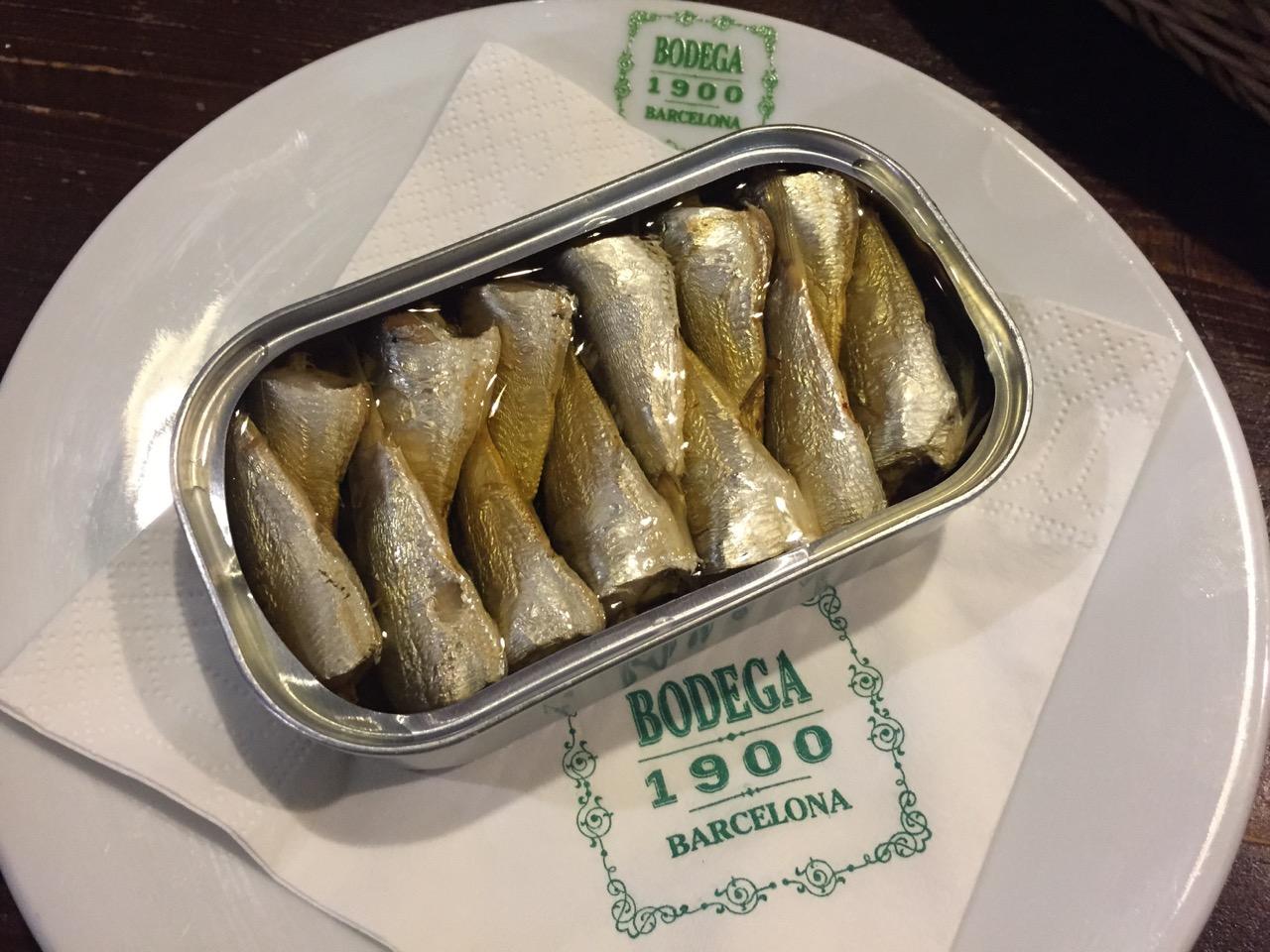Sardines usually come in oil and vinegar, they're just beautiful, briny, full of that sort of rich oily, unctuousness that's only present in these cans, or tins of Spanish seafood.
Steve Dolinsky is traveling in the land of paella, croquetas, and sangria, all traditional dishes that should clue you in that he's visiting Spain. As a food writer and co-host of The Feed podcast, Dolinsky likes to scout out new culinary trends every chance he gets.
He texted us the other day from Barcelona mentioning that he’d had an memorable lunch at the Mont Bar near the University of Barcelona.
“The first thing they bring out? A couple of plates filled with canned seafood and I'm like, wait a second, what is this Chicken of the Sea? Are you sure this is a nice place?”
So Dolinsky does a little investigating and sure enough he discovers that in Catalonia (a semi-autonomous region of Spain), locals prize their canned seafood, or what’s sometimes called Latillas (little cans).
Not only served at restaurants and cafes, canned seafood is widely available at almost every grocery store, says Dolinsky. “There were cockles and mussels, sardines and anchovies, and sea urchins. The list goes on and on. It’s unbelievable. “
In the US, some grocers and gourmet shops are beginning to carry Spanish tins of seafood, but most often they carry tuna, salmon and maybe anchovies if you’re lucky. Dolinsky says that Spain’s seafood comes mostly from the pristine, abundant region of Galicia on Spain’s Atlantic coast, and then it’s shipped across the country.
“They process it right there. You’d think they would freeze it and ship it off somewhere to be packed, but no, they process it right there. They pack it into tins or cans usually with oil or vinegar, or in some cases, restaurants they have specific recipes they give the fisherman and the processors when they put the sardines or mussels in the cans, they want it with the recipe, with perhaps some spices or vinegar or olive oil, and garlic.”

Spain’s seafood in cans is good tasting, high quality stuff and tins of sardines, sea urchins or anchovies usually sell for between $10 and $20. Dolinsky’s already bought a collection of tins of octopus and sardines to pack in his suitcase to bring home as well as his favourite, anchovies.
“Anchovies usually come with oil and vinegar, they're just beautiful, briny, full of that sort of rich oily, unctuousness that is only present in these cans or tins of Spanish seafood.”
As for those baby eels we mentioned earlier. Well, they’re a special case.
“They’re a little bit weird to be honest with you,” says Dolinsky, “it's more a textural thing instead of a flavor.” He quickly adds that he’s used to eating barbecued eel and he loves to order Japanese unagi eel at sushi restaurants but “the baby deals are like tiny worms usually served in a tapas restaurant stacked on a piece of French bread. I won’t say they’re disgusting but the baby eels freak me out. They are really weird and squishy in your mouth and they're just not something I want to have again. But the anchovies and the razor clams, I can eat all day long!”
Besides his tins of anchovies, Dolinsky says he’s bringing home a Catalon tradition called Vermouth. In Barcelona “vermouth hour” is a tradition of gathering with friends to share an afternoon aperitif, and the usual side dishes. It’s basically a snack meal sometimes before lunch and that’s a tradition he plans to carry on when he returns to Chicago.
“They'll have beautifully crisp potato chips, wonderfully fruity olives, and then some anchovies or some sardines, and you have a little glass of wine or a beer and it’s like a snack before lunch.”

Here's a short list of Spanish seafood to look for:
Angulas – Baby Eels
Berberechos – Cockles
Boquerones en Vinagre – Fresh White Anchovies in Vinegar
Boquerones al Ajillo – Fresh White Anchovies in Garlic, Vinegar & Oil
Navajas al Natural – Razor Clams in Brine
Mejillones Picantes – Spicy Mussels
Anchoas – Anchovies
Chipirones Rellenas en su Tinta – Stuffed Baby Squid in Ink
Pulpo en Aceite de Oliva – Octopus in Olive Oil
Pulpo a la Marinera – Octopus in Marinera Sauce
Every day, reporters and producers at The World are hard at work bringing you human-centered news from across the globe. But we can’t do it without you. We need your support to ensure we can continue this work for another year.
Make a gift today, and you’ll help us unlock a matching gift of $67,000!
